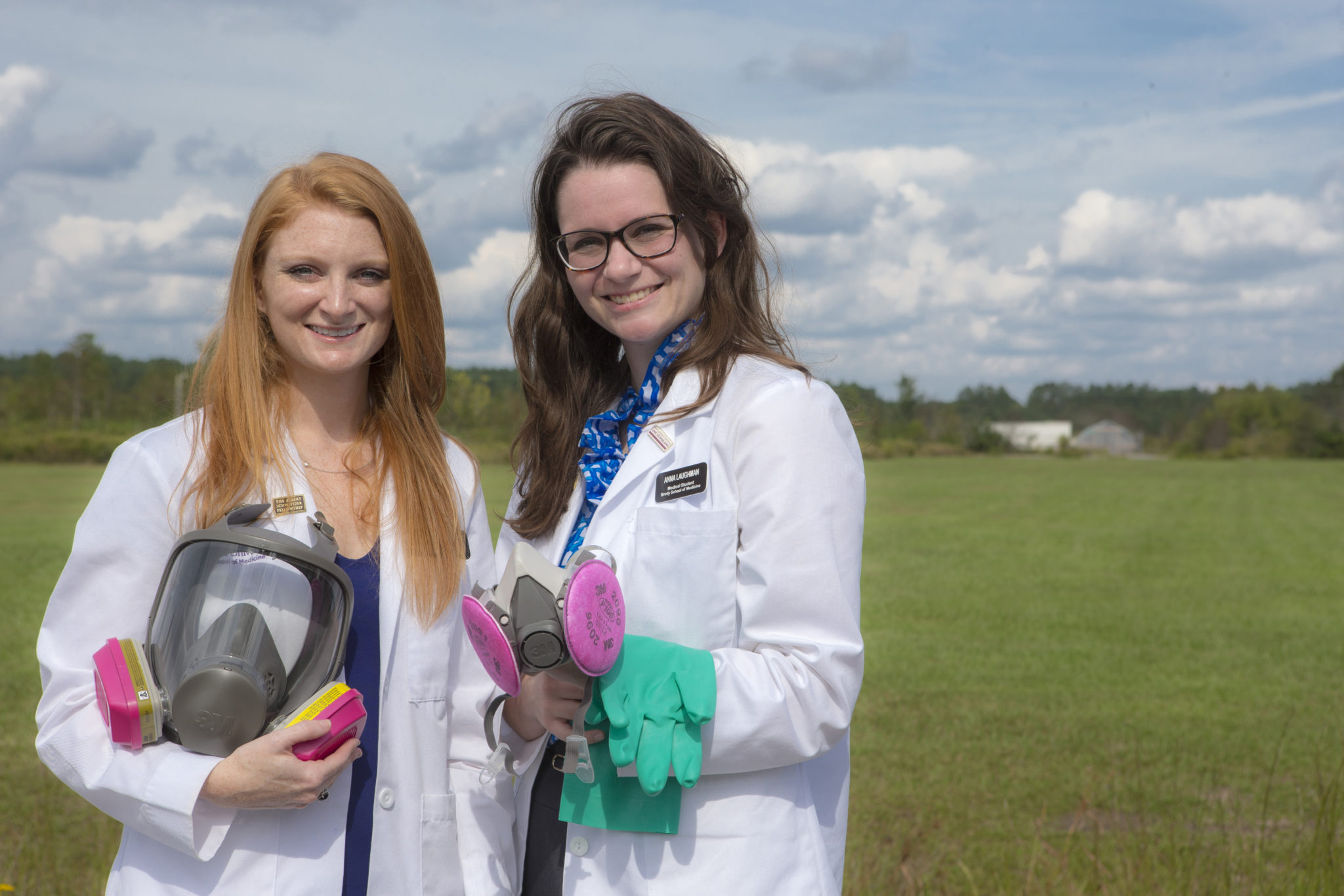Growing up surrounded by crop fields in Ayden, NC, the sights of tractor combines lumbering down country roads and farm workers topping tobacco in the heat of summer were commonplace for Anna Laughman. As a high school student, her interest in improving the health of the farming community led to her volunteering with a 2007 Schweitzer project focused on addressing Latino families’ nutrition and physical activity needs. This experience not only inspired her to learn Spanish and obtain a public health degree, but planted the seed for future work with this community.
Laughman found a kindred spirit in Emily Cunningham. Growing up on a working farm in Walstonburg, NC, Cunningham had a personal appreciation of the dangers of farm work after seeing the injuries from machinery and skin damage from continual exposure her father and grandfather experienced. Not surprisingly, she’s always been interested in issues of health and safety for farm workers. She and Cunningham bonded during their first year at the Brody School of Medicine at East Carolina University over their shared agricultural backgrounds and interest in improving the health of farm workers.
Now, as North Carolina Albert Schweitzer Fellows, Cunningham and Laughman have created a program aimed at educating health care providers and migrant farm workers in Wilson County about pesticide poison prevention. “Unfortunately, this isn’t just an issue for the farmworkers themselves,” said Cunningham. “Families living near the crops can also be affected through pesticide drift.”
“Pesticide exposure and toxicity is a growing health care concern that is preventable by proper protective equipment education and effective health safety training to both farm workers and healthcare providers,” says Laughman. “Emily and I are hopeful that our Schweitzer initiative will increase pesticide safety awareness in local farming communities and provide sustainable educational modules for healthcare providers and medical students.”
“We also wanted to be sure everyone was aware of the new regulations that are in place in 2017 to empower the community to successfully address this issue,” said Laughman.
Their site mentor, Dr. Robin Tutor-Marcom, is Director of the North Carolina Agromedicine Institute, and played an invaluable role in getting them entrenched in the community and ensuring staff was able to assist them when conducting their educational outreach on the farms.
During their work on the farm, they discovered the workers often lack knowledge of, and access to, basic protective gear to prevent their exposure to pesticides and other toxins. While visiting a camp last August, for example, Laughman noticed one worker repeatedly scratching his hands. The man attributed the itching to his gloves, but after a more detailed discussion, Laughman realized the gloves themselves weren’t the problem. Rather, the itch was caused by the nicotine that soaked through his cotton gloves as harvested tobacco plants that day.
“This simple observation lead our outreach team to eventually hand out over 100 pairs of mid-arm length nitrile gloves to farm workers,” said Laughman. “The gloves provide proper protection from pesticides and combat nicotine exposure from harvesting the tobacco. This is just one example about how our project, through direct person-to-person education sessions and conversations, had the ability to provide practical solutions that improved health.”
To help sustain their program, Cunningham and Laughman are currently writing a Problem Based Learning case to be used in the Brody curriculum.
“We plan to highlight many of the dangers of pesticide poisoning and underscore the importance of proper education of occupational hazards in the farming community,” Cunningham says. “We hope this encourages our classmates and future doctors to think strongly about the health of farm workers.”
They are also hopeful that, having educated and empowered local outreach nurses and other providers about how to discuss pesticide safety with farm workers and recognize pesticide toxicity, such care will become routine in the community.
Another important way they are ensuring their project will continue to aid farmworkers is through the creation of a new Agromedicine Interest Group based upon the organization at UNC School of Medicine. They recently received approval to have the group as an official ECU sponsored organization and are excited to get started with this aspect of sustainability.
Both Cunningham and Laughman say they were surprised by how much support and guidance they received from ASF, their academic mentor, Dr. Tom Irons, site mentor, Dr. Robin Tutor-Marcom; and the community of health care providers and farm workers they worked to educate.
“The credit of our project is due to many helping hands,” stressed Laughman.
“We are so thankful to have been part of the Fellowship,” said Cunningham. “We’re very proud to be part of a select group of such hardworking and dedicated individuals. Many of the individuals we’ve met throughout our time as Fellows have demonstrated such passion and enthusiasm for their projects and the people they’re serving. It’s truly inspiring to be part of such a compassionate group.”

